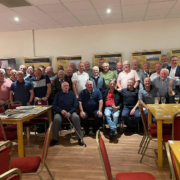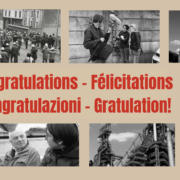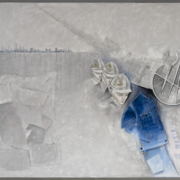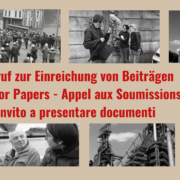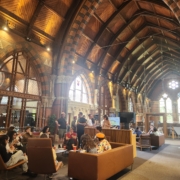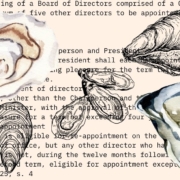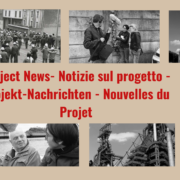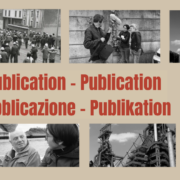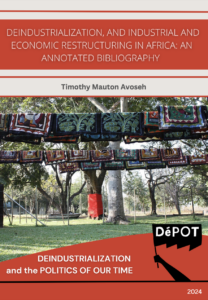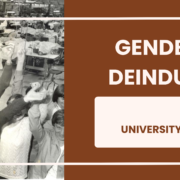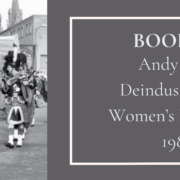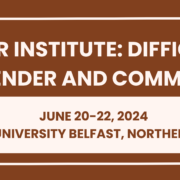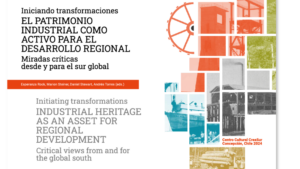
Iniciando transformaciones: El patrimonio industrial como activo para el desarrollo regional. Miradas críticas desde y para el Sur global / Initiating Transformations Industrial Heritage as an Asset for Regional Development. Critical views from and for the global south
eds. María Esperanza Rock Núñez, Marion Steiner, Daniel Stewart & Andrés Torres González
Congratulations to DéPOT affiliate María Esperanza Rock Núñez and her co-editors on this new edited volume on industrial heritage in the Global South. The book, available in English and Spanish, can be downloaded here.
Here is a note from Esperanza on the book:
“The book titled Initiating Transformations Industrial Heritage as an Asset for Regional Development. Critical views from and for the global south offers a critical, interdisciplinary, and international perspective on the subject. This volume, imbued with a forward-looking vision, promotes collaboration and operationalizes respect through the recognition of differences.
Thanks to the collaboration between the Centro Cultural CREASUR (Chile) and the Núcleo de Investigación del Sur (NUDISUR), along with a prominent international network of partnerships such as TICCIH International and the financial support of the Government of the Biobío Region (Chile), a program was launched in 2023 that brought together the public sector, academia, regional artistic spheres, and communities to engage with the industrial heritage of the Biobío region, Chile.
The program assembled over 70 experts from around the world (including Indonesia, Egypt, Nigeria, India, Nepal, Brazil, Mexico, Chile, Argentina, Uruguay, Cuba, Venezuela, Germany, France, Spain, and the United States) in Concepción, Chile, from October 16 to 20, 2023. Together, they reflected on diverse realities and discussed strategies for transforming industrial heritage from and for the Global South.
The event was complemented by the Arts in Ruins Festival and a training program in Collaborative Methodologies for Heritage Projects with a Critical Approach, sponsored by OTEC Cultura y Territorio (www.culturayterritorio.cl) and the Master’s Program in Architectural Heritage Intervention at the University of Chile.
The book is structured into four main chapters. The first chapter provides an introduction to the working method and emphasizes the importance of collaboration and networking. The second chapter documents the experiences and reflections from the “IV International and Interdisciplinary Cultural Heritage Congress on Industrial Heritage, Social Issues and Challenges for New Governance.” The third chapter features aspects of the Arts in Ruins Festival, highlighting how this artistic celebration enriched the congress and showcased the intangible heritage related to industrial heritage and its artistic narratives.
Finally, the fourth chapter addresses training in Collaborative Methodologies for Heritage Projects with a Critical Approach, offering valuable tools and perspectives for public administrators, cultural managers, and professionals from both the public and private sectors for effective heritage management.”
Version Español :
El libro titulado Iniciando transformaciones: El patrimonio industrial como activo para el desarrollo regional. Miradas críticas desde y para el sur global ofrece una perspectiva crítica, interdisciplinaria e internacional sobre el tema. Este volumen, impregnado de una visión de futuro, fomenta la colaboración y operacionaliza el respeto a través del reconocimiento de las diferencias.
Gracias a la colaboración entre el Centro Cultural CREASUR (Chile) y el Núcleo de Investigación del Sur (NUDISUR), junto con una destacada red internacional de alianzas, como TICCIH Internacional, y el financiamiento del Gobierno Regional del Biobío (Chile), en el año 2023 se llevó a cabo un programa que unió al sector público, la academia, las esferas artísticas regionales y las comunidades para activarse en torno al patrimonio industrial de la región del Biobío, Chile.
Este programa reunió a más de 70 expertos de todo el mundo (incluyendo Indonesia, Egipto, Nigeria, India, Nepal, Brasil, México, Chile, Argentina, Uruguay, Cuba, Venezuela, Alemania, Francia, España y Estados Unidos) en Concepción, Chile, entre el 16 al 20 de octubre 2023. En conjunto reflexionamos sobre las diversas realidades y luego se reflexionó sobre estrategias de transformación del patrimonio industrial desde y para el sur global.
El evento se complementó con el Festival de Artes en Ruinas y una significativa formación en Metodologías Colaborativas para Proyectos Patrimoniales con un Enfoque Crítico, patrocinada por OTEC Cultura y Territorio (www.culturayterritorio.cl) y el Magíster en Intervención del Patrimonio Arquitectónico de la Universidad de Chile.
El libro está estructurado en cuatro capítulos principales. El primer capítulo ofrece una introducción al método de trabajo y subraya la importancia de la colaboración y el trabajo en red. El segundo capítulo documenta las experiencias y reflexiones surgidas durante el “IV Congreso de Patrimonio Cultural Internacional e Interdisciplinario sobre Patrimonio Industrial, Cuestión Social y Desafíos para la Nueva Gobernanza”. El tercer capítulo presenta una parte del Festival de Artes en Ruinas, destacando cómo esta celebración artística enriqueció el congreso y puso en valor el patrimonio inmaterial relacionado con el patrimonio industrial y sus narrativas artísticas.
Finalmente, el cuarto capítulo aborda la formación en Metodologías Colaborativas para Proyectos Patrimoniales con Enfoque Crítico, proporcionando herramientas y perspectivas valiosas para administradores públicos, gestores culturales y profesionales del ámbito público y privado para una gestión efectiva del patrimonio.


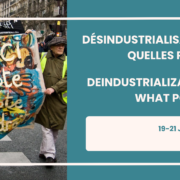
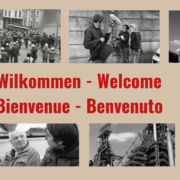

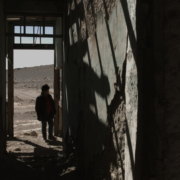 Figure 1. Buenaventura, Ollagüe, Chile. © Alto Cielo Archaeological Project
Figure 1. Buenaventura, Ollagüe, Chile. © Alto Cielo Archaeological Project